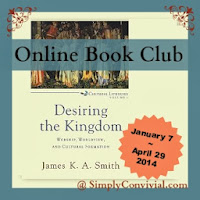
I did not read properly last week and covered the whole chapter instead of just the first half. Sorry about that. There is a lot of material and it should be broken up. To catch up with what others are thinking head over to Simply Convivial.
Last week I said enough about the political arena so I will comment on the second half of our reading. I am particularly interested in his treatment of the university - since I obsess about all things educational. Smith asserts
It [college] is, I suggest, after our imagination, our heart, our desire. It wants to make us into certain kinds of people who desire a certain telos, who are primed to pursue a particular vision of the good life.All education does this - either implicitly or explicitly. A few weeks ago I posted about how the form of school shapes how we understand learning, families and teachers. I also love Andrew Kern's admonition that if the aim of your education isn't wisdom and virtue - then please STOP teaching. Anything less is not good for you or the kids!
James is most familiar with the college campus and discusses these issues in that context - but really that's the end line. The battle starts in preK and before. This idea of the good life and shaping loves is what often, unconsciously, animates fights over
free play versus academic work,
neighborhood ball versus competitive sport,
time in the woods versus time in front of a computer,
reading great literature versus modern, realistic works or non fiction,
knowing history versus learning social studies,
Sabbath versus no Sabbath.
Frequently we look to studies to help us form our opinions about these topics - anecdotes aren't enough any longer. However, just using your common sense you can see how these choices communicate what we value, love and honor. What does the good life include? How accessible is this kind of life? What value does it place on relationships? ideas? the past? our limitations? Many parents are already thinking of college aspirations as they make educational and extra curricular choices for their 4 and 5 year olds (one friend posted as much on her daughter's acceptance to a rigorous kindergarten here in town). College is just a continuation of this theme, but out from under parental influence (as James' sidebar about I Am Charlotte Simmons clearly illustrates).
Much effort and thought has gone into your scholarship, your high SAT scores, your well balanced resume to bring you to the university of your choice. University truly is a finishing school in this regard. You have already had 12 years of schooling and possibly some education that has shaped your desires and loves. Maybe this is one reason why so many people think of college as some of their best years - they spent so long preparing for it and lived it but weren't really equipped to live beyond it? What if we focused our children's attention on raising a family as the most important thing that they will do?
This is one of the reasons we homeschool. I need to renew my mind and help reorient myself to an eternal vision of the good life. I know that at this point, I can't do that in the midst of pressures similar to the one's I grew up under. It will sweep me away and my kids too. Honestly, this book is providing some solid understanding and vocabulary around why I feel the need to create a counter culture in our home. Not one that shies away from the world but one that clearly offers a different vision of human flourishing. I am still working on what that really looks like but some things are allowing my kids to spend time free time with friends, making sure they have alone time to do their own thing, run outside when it's a beautiful day, see their grandparents often, read aloud every day and view academic work as a part of education (not the whole of it). At this point my sense of home culture and Christian vision isn't strong enough to overcome the 35 hours a week plus that they would be part of another culture. Maybe someday that will be different - but for now we are renewing and reviving.
James is helping me to see how content is not the end of the story, form does play an important and often unrecognized role in shaping our practices.

No comments:
Post a Comment